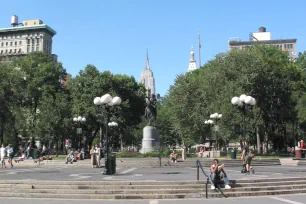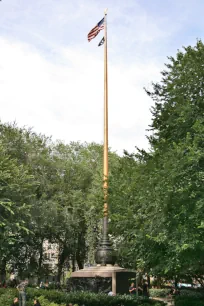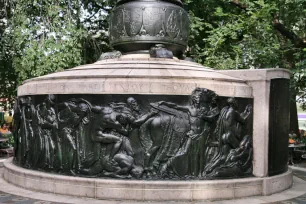Union Square was created in the early nineteenth century at the convergence of what is now Broadway and Fourth Avenue. The square is a popular place for political rallies and public protests. It is also known for its Greenmarket, an outdoor market where local farmers sell fresh produce.
History


Originally used as a potter’s field, the history of the current square goes back to 1811 when the gridiron plan of Manhattan, originally conceived in 1807, was approved. The area was named Union Place, since it was the site of the ‘union’ of two major streets: Broadway and Fourth Avenue (then Bloomingdale Road and Bowery Road). It was officially designated as a public space in 1831.
In 1939 a fenced, oval-shaped park laid out around a central fountain was created at the center of the square. The following decade, when large residences of affluent citizens lined the square, was the area’s heyday. In 1872 the renowned landscape architects Frederick Law Olmsted and Calvert Vaux – of Central Park fame – redesigned Union Square Park. They removed the fence and opened up the space so as to accommodate large rallies, which were often held here at Union Square.
The park was completely recreated and elevated when a subway expansion was constructed below the square in 1928.
After the Second World War the area started to deteriorate and in the 1970s Union Square became known for its drug dealers and was considered unsafe.
Things started to turn around in 1976 with the creation of the Greenmarket, a market with fresh produce. A much-needed renovation finally started in 1985, which resulted in the creation of a new plaza, subway kiosks and two playgrounds. The north side of the park, including a historic pavilion, was renovated again in 2008-2010.
The Square today

Today, Union Square is constantly bustling with activity. The square can be divided into three parts. The north of the square is paved and home to the outdoor Greenmarket.
The central part of the square is occupied by a 3.6 acre (1.5 ha.) large park with wide pedestrian paths and a central lawn. Several statues can be found in the park, the most important of which is an equestrian statue of George Washington, erected here in 1856 to commemorate the reclamation of New York from the British.
The plaza at the south section of the square is still used by political activists, and you’ll often see groups of protesters here. People often occupy the stairs leading to the park while reading a book or eating a snack, especially on sunny days, when the park often becomes overcrowded.


Statues
Several large statues adorn Union Square. The oldest is the bronze equestrian statue of the country’s first president, George Washington. The statue was created by American sculptor Henry Kirke Brown and unveiled in 1856. It was located on a traffic island until 1930, when it was moved to the south side of the park.
Brown also modeled the statue of another president, Abraham Lincoln, which was erected in the Union Square Park in 1868. It is located at the north end of the park.
The bronze sculpture of Marquis de Lafayette, a Frenchman who fought for the Americans in the Revolutionary War against the British, was sculpted by Frédéric-Auguste Bartholdi, better known for his Statue of Liberty.

A more recently added sculpture is the bronze statue of Gandhi, installed in 1986. Other monuments on the square include the James Fountain, installed in 1881 and created by the German sculptor Karl Adolph Donndorf; and the Independence Flagstaff, a large flagpole on a base decorated with bas-reliefs. The reliefs depict allegorical figures representing democracy and tyranny. Right above, you can see the emblems of the thirteen original colonies.
Greenmarket
The most popular feature of the park is the Union Square Greenmarket, an outdoor market where farmers sell fresh produce. The market always attracts throngs of shoppers who browse the stalls with fruits and vegetables.
The Greenmarket was created in 1976 by Barry Benepe, who, with the approval of the city government, brought in local farmers who set up stalls on a parking lot just north of Union Square park. The Greenmarket became a huge success and the activity caused by the market sparked a revitalization of the whole neighborhood.

